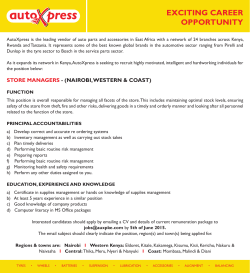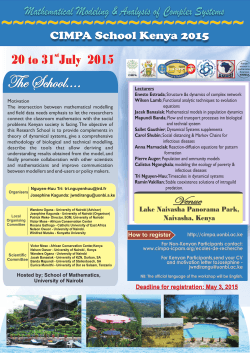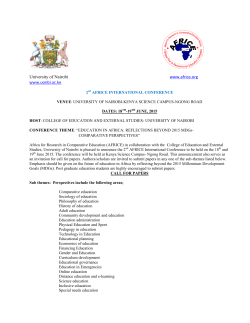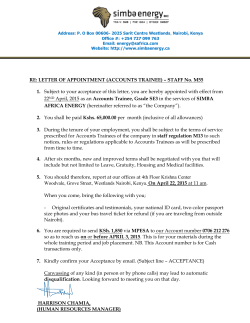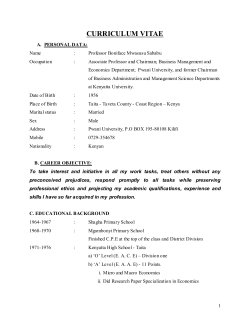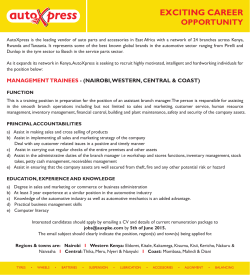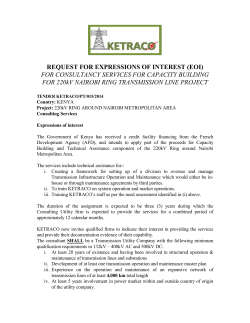
Popular Expression in the `Silicon Savanna`: Perspectives
Popular Expression in the ‘Silicon Savanna’: Perspectives on the Digitization of Art and Life in Kenya, Goethe Institut, Nairobi, 10th July 2012 Event Report (A. Eisenberg) I organised a one-day conference in Nairobi on 10 July 2012, with invited speakers from the faculties of the humanities departments at my affiliating institution in Nairobi, Kenyatta University, and non-academics involved in the Kenyan music and media industries. The event was designed to provide a forum in which Professor Born and I could engage with local humanities scholars and music industry stakeholders, offer them an overview of the MusDig project, and foster empirical and theoretical discussions that might continue throughout the course of the project. The theme of the conference, the digitization of popular expression in Kenya, encompasses the main concerns of the MusDig project while being broad enough to draw in participants and audience members from outside the field of music. This breadth of thematic scope emerged from my partnership with Dr Mbugua wa Mungai, a folklorist and popular culture scholar who holds a position within the Department of Literature at Kenyatta University. Dr. Mbugua, whom I first met at a conference at the Programme of African Studies Birmingham in 2010, facilitated my affiliation with Kenyatta University, and has been a valuable interlocutor for my research. He has written on popular music consumption in Nairobi, drawing on both ethnographic data and literary analysis, and has conducted in-depth research on Kikuyu popular music for Ketebul Music, a non-profit Afro-fusion label that I have examined closely. Dr. Mbugua and I began planning the event in earnest in April 2012. We settled on a theme very quickly. I then drew up the blurb and began contacting potential participants. From the beginning, Dr. Mbugua and I were committed to making the conference one in which non-academic practitioners would present their ideas alongside scholars. We felt that this would lead to mutually beneficial discussions among the presenters while also drawing a diverse audience that would include stakeholders in the music and media industries. For me there was no question that we needed to do this, as it would be the best way to ensure that the event answered the task set out in our ethics protocol, which is ‘to foster dialogue on the research and findings’. Dr. Mbugua confirmed all of the academic presenters. All except one were faculty members at Kenyatta University. Most of these are from Dr. Mbugua’s home department, the Department of Literature, but the Department of History and the Department of Music and Dance were also represented. As is clear from the programme, popular culture in the digital age has become a central research topic at Kenyatta University across the humanities. The sole academic on our programme who was not affiliated with Kenyatta University was the African literature scholar Dr. Kimani Njogu, one of Kenya’s most well known public intellectuals. Dr. Njogu runs the academic publishing company Twaweza, which has put out a number of edited volumes on media and the arts in Kenya featuring Kenyan and international scholars. I took up the task of bringing in non-academics who would be willing and able to speak in an academic setting. Two of the presenters I confirmed, June Gachui and Bill Odidi, were obvious choices. Gachui, who is a lawyer with an LL.M. in intellectual property law, has been a very important interlocutor for me with respect to issues of intellectual property. As the General Manager of the Kenya Association of Music Producers, she is deeply involved in local struggles over music licensing in the digital age. Odidi is a journalist, radio producer, and television news presenter for the national broadcaster, KBC. He is also a researcher, who, like Dr. Mbugua, has worked on Ketebul Music’s Ford Foundation-funded documentaries on the history Kenyan popular music. The venue chosen for the event, the main auditorium of the Goethe Institut-Nairobi, was provided by the Institut at no charge. In addition, the Institut supplied a projector and sound system, and furnished MusDig with an audio recording of the event. The Institut is known both for presenting innovative academic workshops/conferences and for supporting Kenyan digital arts through their on-going patronage of the music and visual art of Kenyan electronic dance music group and art collective Just A Band. For Dr. Mbugua and me, the Goethe Institut-Nairobi seemed a very good choice, because it is centrally located in the city and well known to many in the music industry. In addition to mixing academics and non-academics, Dr. Mbugua and I decided to try one other innovative move for our conference, one that we felt to be highly appropriate to the theme: we set the conditions for extending the discussions in the conference well beyond the walls of the Goethe Institut-Nairobi, by inviting experienced bloggers to engage in live tweeting and blogging during the proceedings. In consultation with Nanjira Sambuli, one of the invited presenters who is an active blogger, we extended a handful of invitations to local bloggers who are known for their writing on digital technologies, the arts, or both. We ended up with two bloggers, James Wamathai of Wamathai.com and Kennedy Kachwanya of Kachwanya.com. Nanjira Sambuli also live tweeted the event, and later created an archive of all the event tweets on Storify.com.
© Copyright 2025
